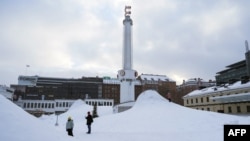The icy Siberian weather now gripping Europe might have sent a chill through European Union capitals a year ago, as they scrambled to wean themselves off another Russian import: energy.
But few are fretting about running out of reserves this winter, as thermostats inch up to keep the cold snap at bay. Gone are dire warnings of possible power cuts that sent Germans scrambling to stockpile candles and French villages — along with the iconic Eiffel Tower — to go dark at night in an energy conservation drive.
“Europe’s energy crisis is over,” said Jacob Kirkegaard, senior fellow at the German Marshall Fund policy institute. “Even if we get a very cold winter, there’s not going to be a major gas shortage in Europe. The infrastructure has improved, demand is a lot lower. And that demand reduction is permanent.”
Once Europe’s top energy supplier, accounting for nearly 43% of overall imports, Moscow has seen its share sharply reduced, thanks to EU coal and oil sanctions over the war in Ukraine and Russia's own gas cutoffs to many member states. The bloc has called for phasing out Russian gas imports by 2027.
Today, the United States and Norway are Europe’s top oil and gas suppliers, according to EU statistical agency Eurostat, even as the bloc taps other markets such as Algeria.
Fossil fuel demand has also dropped, thanks to a mix of energy conservation, warmer winters and a sharp rise in green energy.
But some warn against complacency. Rebel EU member Hungary announced it would ramp up energy imports from Russia, while a loophole allows another, Bulgaria, to continue importing Russian oil above a sanctions price cap — boosting Moscow’s war chest, reports say.
Europe’s transition to clean energy needs to be faster and more holistic, experts say, while others note it remains dependent on Moscow for fuel and services for its Russian-designed nuclear power plants.
Europe “remains at risk to Russian energy extortion as long as its energy transition remains incomplete,” the Atlantic Institute think tank wrote in a September analysis that called on the bloc to press on with its energy decoupling from Russia and its climate change commitments.
Still, the energy scenario is sharply different from just over a year ago, when Europeans feared running out of power during the coldest winter months. French officials lowered public school thermostats and turned off municipal street lighting during the early morning hours.
Germany — once reliant on Russian gas for about 60% of its imports — saw a run on candles and firewood as citizens stocked up, even though chances of power cuts were low. Danish citizens were urged to switch from dryers to clotheslines, and Slovaks from stoves to microwaves.
New suppliers and green power
Today, EU powerhouse Berlin is turning to Norwegian gas and importing liquified natural gas, or LNG, from the United States, renting and building floating terminals to store and process supplies — infrastructure it didn’t have a year ago.
Without relatively inexpensive Russian gas, EU chemical and fertilizer industries are scaling back production. The region is importing such goods instead. “There’s no longer a business case for that kind of production in Europe,” analyst Kirkegaard said.
The bloc has also accelerated its transition to clean energy in recent months, with the EU’s executive arm vowing to phase out fossil fuels well before 2050. High European carbon-trading prices to offset carbon emissions have also provided “a huge incentive for businesses to exit fossil fuels,” according to Kirkegaard.
"A growth model centered on fossil fuels is simply obsolete," European Commission chief Ursula von der Leyen said last year.
Yet critics say soaring rhetoric and promises made in Brussels do not always translate into concrete action in European capitals.
“We’ve seen positive trends and good synergies,” said Camille Defard, who heads the energy center at the Jacques Delors Institute, a Paris-Based think tank that is calling for more funding and coordination to ensure Europe’s climate goals are met.
“However,” she said, “the measures that have been implemented so far are too temporary, too voluntary and too national to really foster effective European action.”
Nor are all EU members on the same page when it comes to Moscow. An EU loophole allows Bulgaria, for example, to import Russian oil above an agreed-on $60-a-barrel price cap, Politico reported, boosting Russian profits that it can plow into its Ukraine offensive. Spain continued to source substantial LNG supplies from Moscow, while Hungary’s Victor Orban has stepped up winter gas imports.
Meanwhile Russian President Vladimir Putin recently called for seizing domestic energy assets owned by “unfriendly” European countries, with compensation terms set by Moscow.
Still the larger trend is clear, analyst Kirkegaard said.
“It’s true that some European buyers are supplying Russia with money” from energy purchases, he said. “But that isn’t dependency on Russian energy — that is over.”











